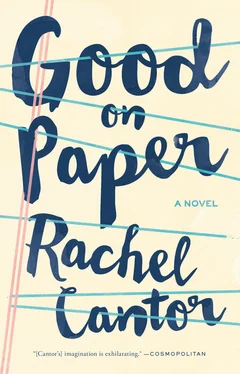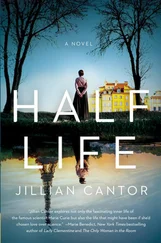Not really, I said. The kitten squirmed in his hand; drops of milk dribbled down its face.
I said, at least you , Shira, were literate, at least one could have a civilized conversation with you . She never finished high school, you see. She’s dyslexic; she’s terrified people will think she’s stupid. All year I’ve been training her to do battle in the New York art scene. You can do it! Now what’s the difference between a Warhol and a Jasper Johns? It took guts for her to work in a bookstore. Yup, I really got her.
Oh, Benny!
I’m a credit to my race. I’m sure you’re proud to know me. Want to know something funny? He put the bottle down, the kitten back in the box. Baruch, he said. My Hebrew name.
Hebrew name?
The name by which I’m recognized when I go up to Torah. You know.
No, I don’t know. What’s funny about it?
It means blessed .
Oh, I said. I take it you don’t feel blessed.
Benny just laughed.
Full disclosure? I said. I’ve been feeling rather miserable myself.
But Benny was slumped over his arm, sobbing.
I loved her. I really thought I loved her!
Could have knocked me over with a feather.
•
Not my finest hour, he said finally, lifting his head. Lucky you: you get to witness this.
How about I help you clean up? I said, my hand on his shoulder. We could get takeout from the Eight Bar. It’ll be fun.
I’m thinking of closing the store.
Well, you’ll have to till we get it cleaned up. We should be able to do a lot of it tonight.
I mean for good. Work on Gilgul full time — I’ve got backing for four issues. I can’t help thinking that if I can change the structure of my life, the deeper things, the more difficult things, will also change. Easier to stay away from paranoid rageaholics if I don’t work with them, right?
Sure, I said. You’ll just hire them to copyedit, I thought.
I could work a regular business day, get myself a life.
Ooh, I said, a life! What’s that?
Life for Dummies , he said.

We worked a few hours, trading songs as we reshelved. I knew the torch songs Ahmad’s ex had taught Andi, also “Eensy, Weensy Spider” and your basic Raffi medleys; Benny knew Clapton’s early solos, songs from the Yiddish theater. We’d been at it an hour when Benny dropped his books and ran to the back of the store. I lost sight of him, then heard an anguished cry. He returned holding Marla in his arms. She was frothing at the mouth; she looked half dead.
That crazy bitch stapled her paws together! he said.
She had, front and back. We put her in her box, rushed her with the kittens to an all-night vet on Broadway, where we learned that Marla had probably been left on a top shelf: she’d fallen a substantial distance and, missing the use of her legs, had been unable to break her fall. She was bleeding internally, all nine lives simultaneously at risk.
Never seen anything like it, Dr. Ghosh said, then disappeared with Marla into an exam room. An assistant fed the kittens with an eye dropper.
I should have found her sooner! Benny said.
I held his hand, but wasn’t sure he noticed.
It’s my fault, he kept saying, my fault!
Not your fault, I said, thinking, It’s mine .
She said the cat was possessed, Benny said, shaking his head. I should have known!
Marla died at around ten. Nothing to be done, Dr. Ghosh said. You say it could have been anyone in your store did this?
Benny nodded. Dr. Ghosh offered to take the kittens, find them a home. Benny nodded again, and we walked into the rain.
With quiet words, I offered to make dinner. I poured water into a heavy pot, was about to light the stove when he appeared and wrapped his long arms around me, buried his beard in my shoulder. I turned, put my arms around him, lost my face in his sweater.
I’m so sorry, I said, then realized that I was crying, we were both crying, for our big mistakes, and small, the people we hurt as we stumbled along, the endless recycling of our same old shit, the torment we put ourselves through as we ran in place, trying to escape — what? I didn’t know, but then Benny started kissing me, and I kissed him back, not sure what I was doing or why. Then an image came to me, not from memory but from “Confessions”: Ahmad kissing Shira at fifteen, Shira thinking about T. but kissing him back — also, a line from that story: I knew nothing about myself — who I was and what I wanted; this, it seems, made anything possible . Young Shira had made nothing but mistakes. I pulled myself out of Benny’s arms. We were both breathing hard.
Not a good idea, I said.
Benny’s eyes, soft and wet, became small and stonelike.
Benny? I said.
You know what you are? he said, but I knew his game. I didn’t know what my soft spot was, but I was sure he did.
Your bullshit won’t work with me, I said, because I knew it would. My heart drummed in my chest as I tried to squeeze past him. He was blocking the door, his body a dead weight. Let me pass, I said, holding my hands in fists so he wouldn’t see them shake. His face crumpled.
I’m sorry, he said, hanging his head, but still he didn’t move.
It’s fine, I said, lying again. I’d like to pass. Let me through. Thank you, I said, as Benny, dumb with sorrow, turned to let me by.
Call me? he said.
Sure, I said, lying for the third and final time.

It was my morning to get Andi off to school. She wanted to wear a frilly dress; I let her.
Ahmad and I still hadn’t talked. We hadn’t even made eye contact since that night on the train.
Ahmad, I said as he passed me in the hall. He pretended not to hear.
Ahmad, I said. I don’t have a boyfriend. Really.
He shut his door.
I’ve done as we always said we’d do, I thought. I’ve kept my affairs out of the house. My family is everything, you’re everything. Ahmad? I’d never do anything to hurt us. Come out. Please! We’ll talk about Connecticut. I promise, we’ll talk.
I said none of these things. I stood at his door, hand on the jamb as if feeling for tremors.
He and Andi left together, Andi looking over her shoulder with a worried expression. I blew her my usual hurricane kiss, sent with all my motherly might; she, as usual, pretended it landed with great force on her cheek. But she knew nothing was usual.
Still wearing my father’s bathrobe, I brought my coffee to the study. Romei’s next section had arrived, together with a faxed photo of Romei in a too-small chair next to a hospital bed, where a small woman — Esther, presumably — lay lost in her bedclothes and a tangle of tubes. Above Romei on the wall, a crucifix. On a table to his right, a laptop, a printer, a fax machine.
He was working in his wife’s hospital room? His wife was dying and he was writing?
Of course: the next pages of Vita Nuova were about death (or, as Romei put it, more precisely, “The Harrowing”), when the hero makes his obligatory visit to the underworld. Poor Dante! The poetics he’d stored against his ruin were about to collapse. First, the death of Beatrice’s father — a small death by cosmic standards, but when Dante learns of it, he grieves so much (for her sake) that the ladies who attend her speak of his grief, his suffering. He is so grieved he becomes gravely ill. On the ninth day, so weak he cannot move (corpselike, in other words), he understands that his beloved, too, will one day die. He envisions her death, and his own. Birds fall from the sky, the earth trembles, the sun grows dark, and the stars begin to weep, as Beatrice’s soul, accompanied by angels, ascends to heaven. His cries break through his dream, he is crying!
Читать дальше













